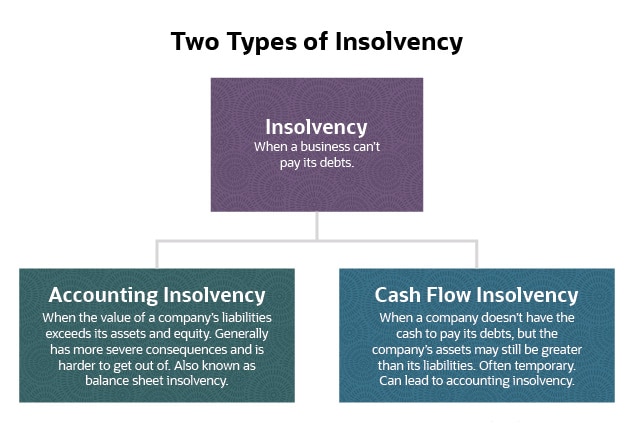The smart Trick of Insolvency Practitioner That Nobody is Talking About
The smart Trick of Insolvency Practitioner That Nobody is Talking About
Blog Article
The 8-Minute Rule for Insolvency Practitioner
Table of ContentsLittle Known Facts About Insolvency Practitioner.Insolvency Practitioner - An OverviewWhat Does Insolvency Practitioner Mean?The Ultimate Guide To Insolvency PractitionerThe smart Trick of Insolvency Practitioner That Nobody is DiscussingWhat Does Insolvency Practitioner Do?Insolvency Practitioner Things To Know Before You Buy
Bankruptcy is when responsibilities are more than the worth of the firm, or when a debtor can not pay the financial obligations they owe. A business can become insolvent as a result of a number of situations that cause bad money circulation. When confronted with bankruptcy, a company or person can call financial institutions directly and restructure financial obligations to pay them off.Business proprietors may get in touch with financial institutions straight and restructure financial debts into even more convenient installments. Financial institutions are commonly open to this approach due to the fact that they desire to be repaid and stay clear of losses, even if the payment is on a postponed timetable.
Facts About Insolvency Practitioner Uncovered
The proprietor develops a proposal describing exactly how the debt may be reorganized making use of expense reductions or various other plans for assistance. The proposal reveals financial institutions how the company may generate adequate money flow for rewarding operations while paying its financial obligations. Commonly, a forgiven financial obligation may be considered revenue by the Internal Income Solution (INTERNAL REVENUE SERVICE).

The 3-Minute Rule for Insolvency Practitioner
When operations discontinue, so does the firm's revenue (Insolvency Practitioner). Some business end up being financially troubled because their goods or solutions do not evolve to fit consumers' changing demands.
Expenditures exceed profits and bills stay unsettled. Types of insolvency consist of cash-flow insolvency and balance-sheet bankruptcy. Cash-flow insolvency happens when a firm has the properties to cover their debts yet they are in the incorrect form, such as realty rather of liquid funds. Balance-sheet insolvency, on the other hand, suggests an absence of assets in any type of kind to cover debts.
The internal revenue service states that a person is financially troubled when the overall obligations surpass complete properties. A personal bankruptcy, on the various other hand, is an actual court order that illustrates just how a bankrupt person or company will pay off their financial institutions, or just how they will certainly market their assets in order to make the settlements.
The Ultimate Guide To Insolvency Practitioner

Recognizing the elements that can result in bankruptcy, such as overspending, can help you stop bankruptcy and its repercussions.
The Best Strategy To Use For Insolvency Practitioner
It is popular that directors and officers of firms (and managers of limited liability companies) owe fiduciary duties to here their organizations and their shareholders (or participants). These fiduciary obligations are specified by state laws and, though there are variants from state to state, they generally include a task of loyalty and a duty of treatment.
The task of care requires supervisors and officers to exercise persistance, to make educated choices, and to act in excellent confidence so that their actions remain in the most effective interest of the business. Past the extent of this conversation, some states allow these obligations to be restricted either by so keeping in mind in the business files or conforming with various other requirements.
Insolvency Practitioner Can Be Fun For Everyone
Most states define insolvency in two ways( 1) when a business's responsibilities end up being above the amount of its weblink properties or (2) when the company comes to be not able to pay its financial debts as they become dueand welcome both meanings (Insolvency Practitioner). The shift in tasks takes place due to the fact that when a firm is financially troubled, there is no value in the company past that owed to the business's creditors to make sure that the equity owners no more have a financial risk in the company
Beware about giving shareholders favoritism at the expenditure of creditors (e.g., licensing and moneying a returns or a supply redemption). Beware concerning advantageous therapy in between courses of investors. Make reasonable efforts to find out all the truths before taking a certain training course of activity; supervisors ought to really think that any type of choices made are in the most effective interests of the company in its entirety (i.e., choices will certainly be reviewed in knowledge because of the impact of such activities on the firm).
In any type of insolvency or bankruptcy proceeding, payments made to certain financial institutions at the expense of various other lenders can be clawed back, specifically if Read More Here there is some connection in between the company and the creditor. Consider suggesting at an annual investor conference (or any other conference of stockholders) a resolution verifying that all previous service choices and activities taken by the directors and policemans of the company were absorbed good confidence after a workout of practical care.
What Does Insolvency Practitioner Do?
Completely disclose any kind of individual or service connections with parties on the various other side of transactions including the firm to stay clear of the appearance of a problem of interest. In examining potential fund increasing purchases or a sale of possessions of the troubled corporation, be aware that these deals may be looked at later on due to any type of subsequent expansion of directors' fiduciary tasks to include creditors.
Report this page